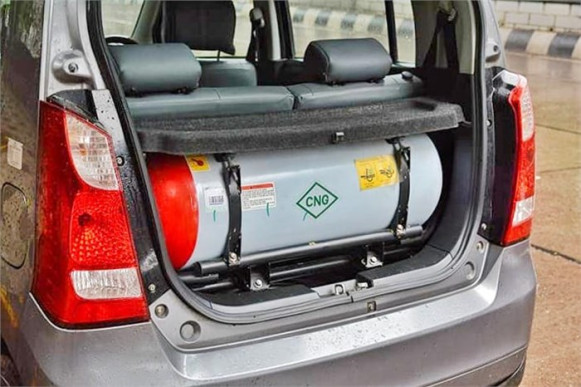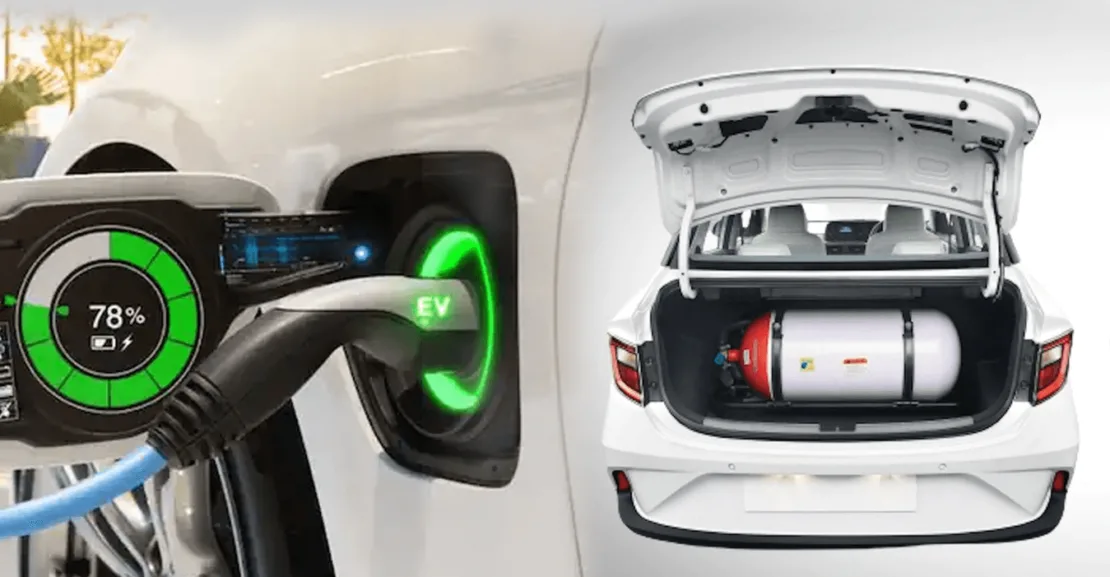As the Nigerian government pushes for full-scale adoption of Compressed Natural Gas initiative (CNG) for use in transportation, there are concerns about provision of necessary infrastructure to facilitate the process.
Also, there are concerns about the cost of conversion of vehicles powered by diesel and petrol to run on CNG and the safety implications if not properly managed.
Join our WhatsApp ChannelAs part of measures to reduce the cost of transportation that surged after the removal of fuel subsidy and the deregulation of the petroleum market, the Bola Tinubu administration expressed interest in adopting CNG, leading to the launching of the Presidential Compressed Natural Gas initiative (PCNGi) in August 2023.
The PCNGi aims to provide a cheaper and cleaner fueling alternative for Nigerians. Aside from reducing transportation costs, the initiative is also geared towards promoting environmental sustainability, creating job opportunities and encouraging investments in Nigeria’s vast gas resources. It is also part of efforts to diversify energy sources and reduce dependence on petroleum products, which is still largely imported.
One of the key components of the PCNGi is the development of necessary infrastructure, including conversion facilities, CNG refuelling stations and maintenance facilities to enable rapid adoption of CNG across the country.
Some of the key implementation programmes of the PCNGi include organising workshops on CNG adoption, and deployment CNG or bi-fuel vehicles along the three major transit corridors in Nigeria: Lagos — Ibadan – Ilorin; Lokoja – Abuja – Kano; and Uyo – Port Harcourt – Onitsha –Benin; training of professionals (auto technicians, engineers, and support staff) on CNG. For the funding scheme, the initiative aims to raise $25 million in the pilot phase, $75 million by the end of 2024, and $250 million by 2027 to support the development of CNG infrastructure in Nigeria.
CNG Adoption Challenges
While the CNG initiative in Nigeria is a step in the right direction towards a sustainable and economically resilient future, there are challenges in the adoption at this stage.
There are concerns about lack of refuelling stations and other infrastructure that facilitates the adoption in transport across the country.
Commenting on the initiative, an energy expert, Kevin Emmanuel, observed that there are basic infrastructural challenges that need to be resolved to make it work.
READ ALSO: Tinubu’s Choice: Fuel The Nation’s Suffering Or Convert To CNG?
According to the energy expert, Nigeria has only 4,335km of gas pipes in the multi-product pipeline infrastructure, and is still struggling to get the Ajaokuta–Kaduna–Kano (AKK) Natural Gas pipeline done. The AKK is a pipeline Project planned to transport natural gas from Ajaokuta in Kogi State to Kano State. The entire north and South-east are still not connected to the gas pipeline system.
Highlighting the solution, Emmanuel said: “You need to set up mother and daughter stations around Nigeria — these stations require pressure metering and reduction stations to enable points for depressurisation and drawing of pipes to power compression units.
“You can’t set up PMRS (Pressure Regulating and Metering Stations) around Nigeria because Nigeria has only 4,335km of gas pipes in the multi-product pipeline infrastructure, its struggling to get AKK done because of FX revaluation losses to EPC, which means the entire North is disconnected from supply — the entire South East does not have a single pipe that runs through it, as the Aba- Owerri- Enugu-Onitsha-Nnewi line of 121km has not even come to FID from Nigeria Gas Infrastructure Company (NGIC) — there’s also the problem of the national reference cap in calculating the domestic base price for gas under the domestic gas delivery obligations (sections 108 of the PIA) to Gas Based Industries (GBIs) and how that affects the availability and security of supply to companies in these value chain.”
FG CNG Conversion Centres
According to the Presidential CNG Initiative (PCNGi), there are 137 conversion centres in Nigeria for now. The centres are located in FCT, Lagos, Edo, Kaduna, Ogun, Oyo, Kogi, Nasarawa, Rivers, Kwara, Ekiti, Akwa Ibom, and Cross River, States. However, none is currently located in North-east and South-east states, raising questions about the geographical spread and access by residents.
To reduce the burden for commercial transport operators, the Federal government had in July announced a list of centres where conversion can be done for free under the PCNGi.
READ ALSO: Free CNG Conversion Centres Across Nigeria [See Full List]
The Programme Director/Chief Executive, PCNGi, Michael Oluwagbemi, who signed agreements with various companies involved in the conversion, stressed that through the implementation of the programme, Nigerians would start paying less for transportation. At a Park-to-Park CNG conversion rally in Lagos in July, where 150 conversion kits were distributed to members of transport unions, Oluwagbemi disclosed that over 30,000 kits had been bought by the government for distribution nationwide in 90 days, adding that more would be procured for distribution.
To access the free CNG conversion scheme by commercial transport operators, eligible vehicles must be registered with the Road Transport Employers’ Association of Nigeria (RTEAN), the National Union of Road Transport Workers (NURTW), or be state-owned taxis and vehicles with commercial plate numbers.
However, for the private vehicles, the cost varies.

Cost of Conversion
While the price of CNG (about N350 per kilogramme) is relatively cheaper than petrol (which is now over N1,000 per litre), there are concerns about high cost of converting vehicles to use CNG and safety issues. This has placed Nigerians in energy dilemma. Whether to continue to bear the burden of buying petrol and diesel at over a thousand naira or take on the cost of switching to CNG with the safety implications as well, if not properly installed and handled, are hard options to choose by Nigerians.
According to a publication by the National Centre for Technology Management, the cost of converting a vehicle to run on CNG in Nigeria varies based on several factors, including the type of conversion kit, the vehicle’s make and model, and labour costs. The centre put the costs as follows: N300,000 – N400,000 for petrol vehicles, N100,000 to N200,000, for tricycles, N18 million for vans and lorries and N90,000 for others (petrol generators).
However, there are indications that the cost for conversion is higher. Prime Business Africa gathered that the cost for cars is between N1 million and N2 million.
Some have observed that the cost is not affordable to many Nigerians currently using petrol and diesel-powered vehicles.
“I think the cost of conversion to CNG is relatively high compared to the nature of the economy and the current earning power of many Nigerians driving cars who may wish to have it,” Dr Ibeku Ogah, a development economist told Prime Business Africa.
Is the Convert Now Pay Later option viable?
The federal government recently launched a scheme called “Convert and Pay later” which offers people opportunity to convert their vehicles to run on CNG and pay in instalments.
As contained in a statement released by the National Orientation Agency, the federal government introduced a new website that allows users to apply, and after approval, are assisted with conversion of their vehicles. People are allowed to choose ‘a pay-later’ option for the conversion costs.
The agency claimed that the system offers flexible payment plans. “These payment options allow you to convert your vehicle now and pay later with affordable monthly instalments at competitive rates.
“With an easy online application and quick approval process, you’ll receive support every step of the way to ensure a hassle-free experience.
“Visit: gocng.ng to get started,” part of the statement read.
The portal offers options of “outright payment,” “Convert now pay later” “Rent to Own” and “Weekly Rental”.
While some Nigerians commended the scheme, others expressed concerns about the period stipulated for down payment. They suggested extending the payment duration to about one year to enable the average Nigerians afford it.
“I think the 6 months down payment duration is too short for an average Nigerian to want to afford it and also the first installment of N300k may not be very encouraging. I think it is better if they can go for within 10-12 months and deposit or N150k as first installment,” and X user, Ekiti Oracle stated.
“In this economy, you want me to make a down payment of about ₦250k and to complete it within 6 months can sit well with an average car owner. Make the down payment to be free or max ₦50k and make payment ₦1k per day and partner with banks using BVN and automatic deductions,” Gbolahan Obadimeji stated.
REAd also: Oil Games: Dangote’s Refinery, Marketers Battle For Nigeria’s Fuel Future
Some raised concerns about lack of CNG refueling stations across the country. “How many CNG stations do we have across the country / states, their location per local government, for we to be encouraged to switch from PMS TO CNG? Pls think of it. CNG is the best but think of the needful,” an X user, Temi stated.
Safety Concerns
Aside from cost of conversion, there are also concerns about safety in the use of CNG vehicles. Recently, a CNG tank explosion occurred at a NIPCO CNG station in Aduwawa, Benin City, the capital of Edo State, injuring some people. The explosion reportedly occurred during the refueling of a CNG vehicle cylinder. According to Standard Organisation of Nigeria (SON), preliminary investigations revealed that the cylinder used to convert the vehicle did not meet the required CNG standards approved by the organisation. SON said there are differences in structure of Liquefied Petroleum Gas (LPG) cylinders and CNG cylinders, noting that each is designed for different pressure levels and applications. “LPG cylinders are built for a working pressure of 7 bar and can withstand up to 30 bar of gas pressure. On the other hand, CNG cylinders are designed for much higher pressures, with a working pressure of up to 200 bar and the ability to withstand test pressures of 300 bar or more,” the SON stated
The incident highlights the risks associated with improper handling and maintenance of CNG equipment, emphasizing the need for strict safety protocols at refueling stations.
There are indications that the exploded cylinder was fabricated by a welder without proper approval.
SON charged all CNG refuelling stations to always conduct on-the-spot inspections to ensure that vehicles are equipped with approved conversion kits and labelled conversion centres.
Victor Ezeja is a passionate journalist with six years of experience writing on economy, politics and energy. He holds a Masters degree in Mass Communication.



















Follow Us